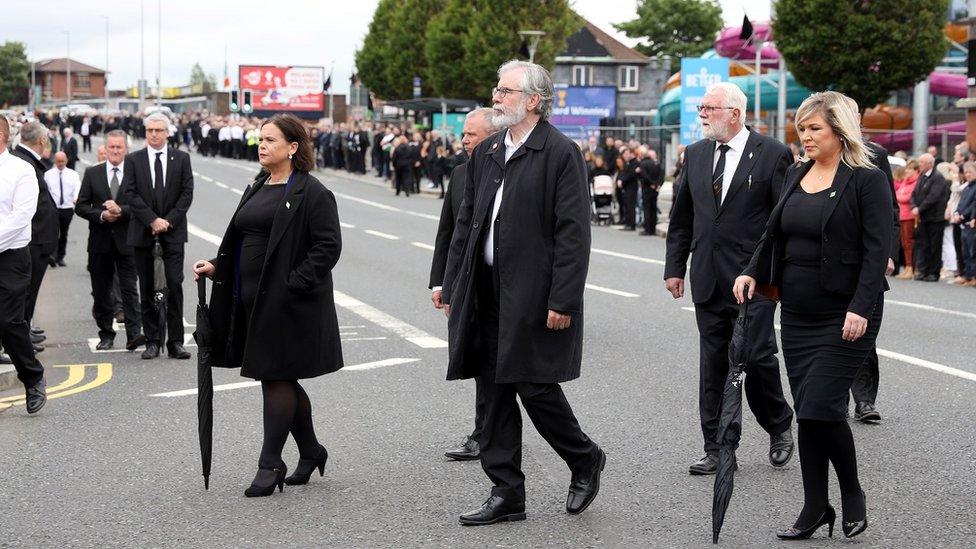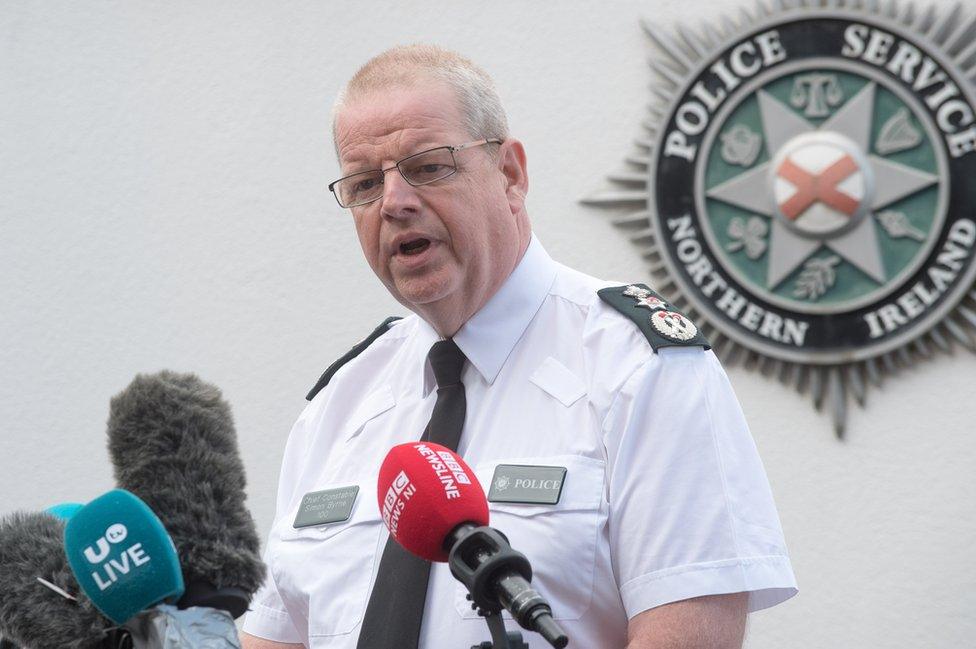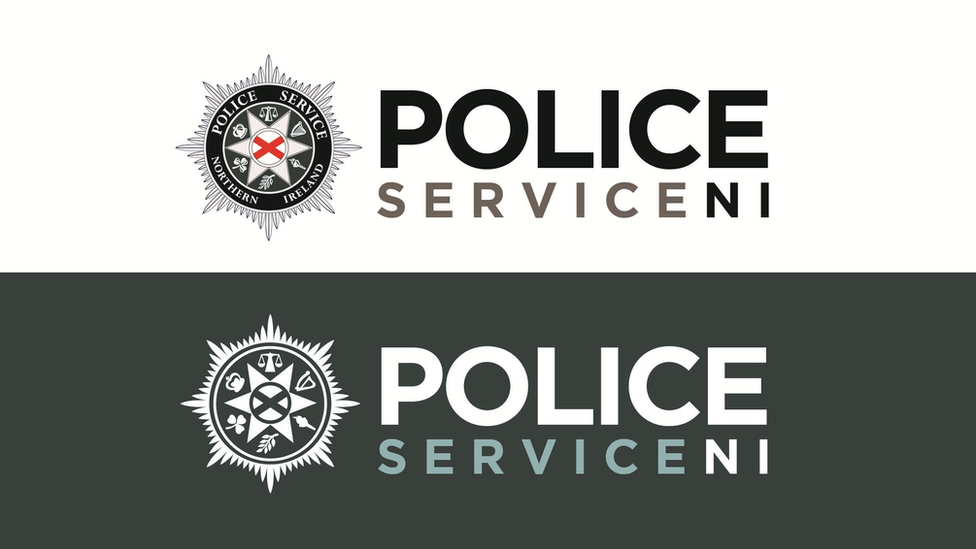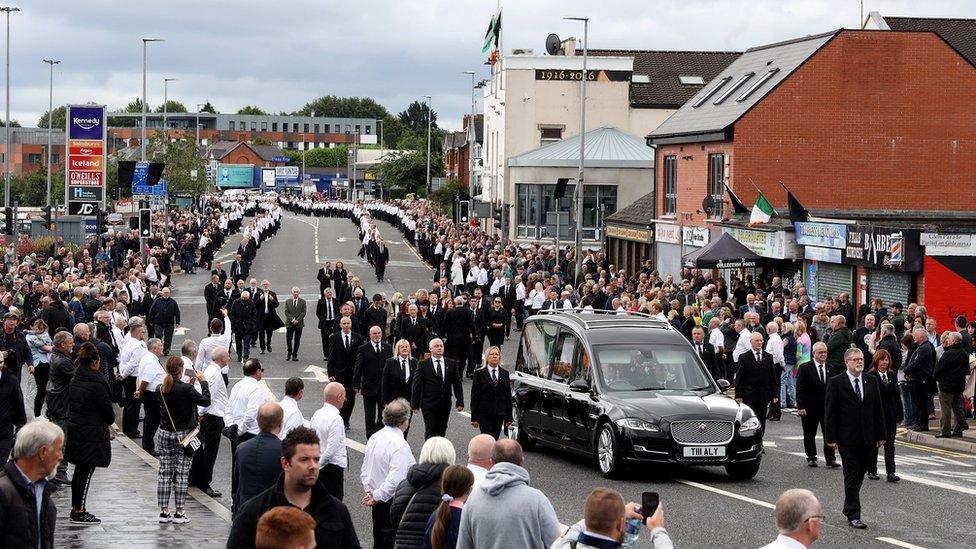PSNI in 2020: Covid-19 challenges and collateral damage
- Published

In the year of the "Four Es", the Police Service of Northern Ireland (PSNI) largely coped with what Covid-19 threw at it, but there was collateral damage along the way.
How it dealt with the funeral of IRA man Bobby Storey and Black Lives Matter protests caused significant problems.
In the short term, the pandemic also disrupted plans to grow and modernise.
And yet, 2020 looked to be starting on a positive note.
With Stormont's resurrection came New Decade, New Approach and the prospect of the police being unburdened, finally, from thousands of Troubles legacy cases and increasing officer numbers to 7,500.
But within months things had changed.
Recruiting in a pandemic
The government backed away from legacy legislation and there was to be no enhanced budget to pay for 600 extra officers, at least in the near future.
There was still a recruitment campaign - for the first time Sinn Féin attended the launch - and numbers did rise from 6,900 to 7,100.
The Northern Ireland Executive, though, found itself swamped by other financial priorities.
Covid-19 also stalled the roll-out of 400 officers going into neighbourhood policing (started but not quite finished) and plans for a re-organisation of the police estate, which might include a new headquarters.
Allow X content?
This article contains content provided by X. We ask for your permission before anything is loaded, as they may be using cookies and other technologies. You may want to read X’s cookie policy, external and privacy policy, external before accepting. To view this content choose ‘accept and continue’.

Chief Constable Simon Byrne got another reminder that Northern Ireland is a place apart in UK policing.
A proposal to change the PSNI crest on uniforms resulted in a hasty climbdown, following opposition from the Police Federation and unionist parties.
Like many other police services, the PSNI struggled getting to grips with health regulations, often hurriedly put together by lawmakers and constantly amended.
It adopted a "Four Es" approach to the legislation: engage, explain, encourage and enforce, either by way of penalty fines or court action.
Initially it misunderstood, or at least miscommunicated, the situation around travel for exercise.
But what attracted louder criticism was its policing of two large-scale public events in June - Black Lives Matter protests and Bobby Storey's funeral.

Sinn Féin president Mary Lou McDonald and vice-president Michelle O'Neill were among those to attend Bobby Storey's funeral, along with former leader Gerry Adams (centre)
There was a stark contrast in approach and drew the police into a debate, which still rumbles on, about consistency of response.
At the protests in Belfast and Londonderry, about 70 fines were handed out for breaches of regulations; at Mr Storey's funeral in west Belfast almost 2,000 mourners assembled in the virtual absence of police.
A Policing Board report would subsequently judge PSNI actions at the Black Lives Matter events to have been potentially unlawful by failing to respect an individual's right to protest.
Mr Byrne issued an apology weeks later following a report by the police ombudsman which, from his viewpoint, put a silver lining on a dark cloud - discrimination was "unintentional".
But damage to relations with ethnic minorities has been done.

Chief Constable Simon Byrne apologised for the police's handling of the Black Lives Matter protests
Mr Storey's funeral was the subject of an investigation which took more than five months to conclude, with the Deputy First Minister Michelle O'Neill among 24 individuals interviewed about potential breaches of health regulations.
The fall-out drew the fire of unionist politicians on the NI Policing Board and in the Northern Ireland Assembly.
As the Public Prosecution Service ponders decisions, questions remain over discussions the PSNI held with Sinn Féin in advance of the funeral.
Mr Byrne claimed intervention on the day would have caused "widespread violence".
But undoubtedly it has created a problem around how some in the unionist community view the PSNI - the Democratic Unionist Party's claim of "two-tier policing" was once a cry within nationalism.
On the security front, the MI5-PSNI counter-terrorism partnership struck a blow to the alleged leadership of the New IRA in August.
Operation Arbacia resulted in nearly 50 charges against 10 individuals who are currently remanded in custody.
The case involved an alleged MI5 agent and the bugging of two houses in County Tyrone.
Authorities are currently watching and assessing how the group reorganises and have insisted that as Northern Ireland enters 2021, the threat posed by dissident republicans remains classed as "severe".
This story was amended on 28 January 2021 to remove the phrase 'IRA veteran'.
- Published9 June 2020

- Published14 May 2024

- Published22 December 2020
